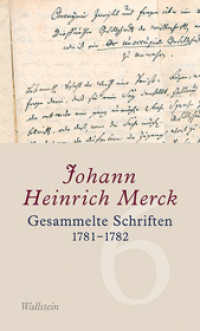- ホーム
- > 洋書
- > 英文書
- > History / World
Full Description
In the 1650s and 1660s, the head of the Russian Orthodox Church, Patriarch Nikon, carried out a series of reforms which were rejected by a large number of the faithful. The split that resulted, the Great Schism or raskol, led a large proportion of the Russian population to become completely isolated from the official church. Known as raskol'niki, they were seen as stubborn opponents of both church and government and were fiercely persecuted. Two centuries later amidst peasant protests, revolutionary conspiracies and government paranoia, Russia's religious dissenters were again at the forefront of national concerns. Russia's autocratic rulers, while equating Orthodoxy with political loyalty, saw the heterodox as a threat to internal security. At the same time, Russian revolutionaries began to look to the people as an instrument of political change. Where all too often loyalty to the Tsar was the defining feature of the peasants, the raskol'niki with their persecuted history and stubborn resistance seemed to promise a well of opposition from which the radicals could draw.
The historian and radical thinker Afanasii Shchapov (1830-1876) championed religious dissent as a politically democratic movement. More than anyone else he defined the relationship between political and religious dissent that was to persist until the revolution of 1917. In examining Shchapov's works together with a wide range of printed and archival sources, Thomas Marsden reveals that the raskol'niki were central to the most important questions of mid-nineteenth century Russian society-those of revolution, nationality, and progress.
Contents
Abbreviations I. Introduction II. The Raskol and Revolution III. The Society of the Raskol IV. The Raskol'nik as the Other V. Conclusion VI. Bibliography








